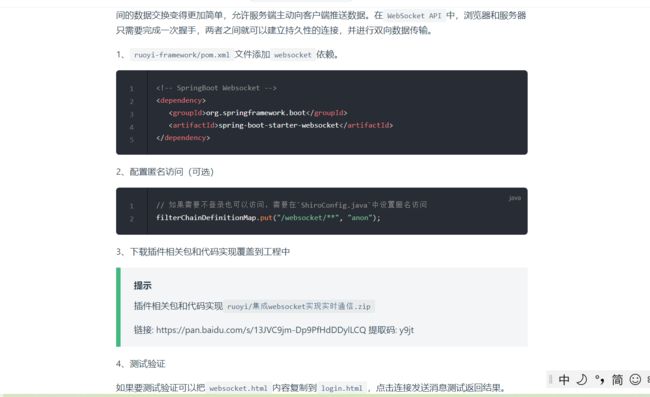集成websocket实现实时通信(ruoyi 使用笔记)
集成websocket实现实时通信(ruoyi 使用笔记
- 1.简单介绍WebSocket
- 2.详细代码
-
- 2.1WebSocketConfig
- 2.2 SemaphoreUtils
- 2.3 WebSocketServer
- 2.4 WebSocketUsers工具类
- 2.5 html
- 2.6 vue版本前端代码
- 2.7 controller
1.简单介绍WebSocket
Websocket 是一种基于 TCP 协议的全双工通信协议,它使得客户端和服务器之间可以进行实时的双向通信。相对于传统的 HTTP 协议只能通过客户端发送请求,然后等待服务端的响应,WebSocket 可以让客户端和服务器在任何时候都可以相互发送消息,这种实时通信的方式非常适合需要实时更新数据的应用场景,比如聊天室、在线游戏、股票行情等。
WebSocket 的运作流程如下:
客户端向服务器发起 WebSocket 握手请求;
服务器返回确认信息给客户端,完成握手;
握手成功后,客户端和服务器就可以通信了;
双方可以随时发送消息到对方,也可以关闭连接。
WebSocket 的好处包括:
实时性:WebSocket 提供了双向通信能力,可以实现实时更新数据的功能;
可靠性:WebSocket 基于 TCP 协议,可以保证消息传输的可靠性;
性能高:WebSocket 的开销小,通信效率高,不会频繁地进行连接、断开等操作,降低网络延迟;
跨域支持:WebSocket 支持跨域通信,可以在不同的域之间建立连接。
在前端开发中,使用 WebSocket 可以使用 JavaScript WebSocket API 来进行操作,常见的库包括 Socket.io 和 WebSocket-Node 等。在后端开发中,WebSocket 的实现可以使用 Node.js、Java、Python 等多种语言和框架。
当然,在使用 WebSocket 时也需要考虑一些安全问题,比如避免跨站脚本攻击(XSS)、防范恶意请求等。
若依网址点击即可;

链接: https://pan.baidu.com/s/13JVC9jm-Dp9PfHdDDylLCQ 提取码: y9jt
2.详细代码
(大家可以去若依下载我自己做下记录而已)
2.1WebSocketConfig
import org.springframework.context.annotation.Bean;
import org.springframework.context.annotation.Configuration;
import org.springframework.web.socket.server.standard.ServerEndpointExporter;
/**
* websocket 配置
*
* @author ruoyi
*/
@Configuration
public class WebSocketConfig
{
@Bean
public ServerEndpointExporter serverEndpointExporter()
{
return new ServerEndpointExporter();
}
}
2.2 SemaphoreUtils
import java.util.concurrent.Semaphore;
import org.slf4j.Logger;
import org.slf4j.LoggerFactory;
/**
* 信号量相关处理
*
* @author ruoyi
*/
public class SemaphoreUtils
{
/**
* SemaphoreUtils 日志控制器
*/
private static final Logger LOGGER = LoggerFactory.getLogger(SemaphoreUtils.class);
/**
* 获取信号量
*
* @param semaphore
* @return
*/
public static boolean tryAcquire(Semaphore semaphore)
{
boolean flag = false;
try
{
flag = semaphore.tryAcquire();
}
catch (Exception e)
{
LOGGER.error("获取信号量异常", e);
}
return flag;
}
/**
* 释放信号量
*
* @param semaphore
*/
public static void release(Semaphore semaphore)
{
try
{
semaphore.release();
}
catch (Exception e)
{
LOGGER.error("释放信号量异常", e);
}
}
}
2.3 WebSocketServer
import java.util.concurrent.Semaphore;
import javax.websocket.OnClose;
import javax.websocket.OnError;
import javax.websocket.OnMessage;
import javax.websocket.OnOpen;
import javax.websocket.Session;
import javax.websocket.server.ServerEndpoint;
import com.lxh.demo.util.SemaphoreUtils;
import org.slf4j.Logger;
import org.slf4j.LoggerFactory;
import org.springframework.stereotype.Component;
/**
* websocket 消息处理
*
* @author ruoyi
*/
@Component
@ServerEndpoint("/websocket/message")
public class WebSocketServer
{
/**
* WebSocketServer 日志控制器
*/
private static final Logger LOGGER = LoggerFactory.getLogger(WebSocketServer.class);
/**
* 默认最多允许同时在线人数100
*/
public static int socketMaxOnlineCount = 100;
private static Semaphore socketSemaphore = new Semaphore(socketMaxOnlineCount);
/**
* 连接建立成功调用的方法
*/
@OnOpen
public void onOpen(Session session) throws Exception
{
boolean semaphoreFlag = false;
// 尝试获取信号量
semaphoreFlag = SemaphoreUtils.tryAcquire(socketSemaphore);
if (!semaphoreFlag)
{
// 未获取到信号量
LOGGER.error("\n 当前在线人数超过限制数- {}", socketMaxOnlineCount);
WebSocketUsers.sendMessageToUserByText(session, "当前在线人数超过限制数:" + socketMaxOnlineCount);
session.close();
}
else
{
// 添加用户
WebSocketUsers.put(session.getId(), session);
LOGGER.info("\n 建立连接 - {}", session);
LOGGER.info("\n 当前人数 - {}", WebSocketUsers.getUsers().size());
WebSocketUsers.sendMessageToUserByText(session, "连接成功");
}
}
/**
* 连接关闭时处理
*/
@OnClose
public void onClose(Session session)
{
LOGGER.info("\n 关闭连接 - {}", session);
// 移除用户
WebSocketUsers.remove(session.getId());
// 获取到信号量则需释放
SemaphoreUtils.release(socketSemaphore);
}
/**
* 抛出异常时处理
*/
@OnError
public void onError(Session session, Throwable exception) throws Exception
{
if (session.isOpen())
{
// 关闭连接
session.close();
}
String sessionId = session.getId();
LOGGER.info("\n 连接异常 - {}", sessionId);
LOGGER.info("\n 异常信息 - {}", exception);
// 移出用户
WebSocketUsers.remove(sessionId);
// 获取到信号量则需释放
SemaphoreUtils.release(socketSemaphore);
}
/**
* 服务器接收到客户端消息时调用的方法
*/
@OnMessage
public void onMessage(String message, Session session)
{
String msg = message.replace("你", "我").replace("吗", "");
WebSocketUsers.sendMessageToUserByText(session, msg);
}
}
2.4 WebSocketUsers工具类
提供一些简单的工具
import java.io.IOException;
import java.util.Collection;
import java.util.Map;
import java.util.Set;
import java.util.concurrent.ConcurrentHashMap;
import javax.websocket.Session;
import org.slf4j.Logger;
import org.slf4j.LoggerFactory;
/**
* websocket 客户端用户集
*
* @author ruoyi
*/
public class WebSocketUsers
{
/**
* WebSocketUsers 日志控制器
*/
private static final Logger LOGGER = LoggerFactory.getLogger(WebSocketUsers.class);
/**
* 用户集
*/
private static Map<String, Session> USERS = new ConcurrentHashMap<String, Session>();
/**
* 存储用户
*
* @param key 唯一键
* @param session 用户信息
*/
public static void put(String key, Session session)
{
USERS.put(key, session);
}
/**
* 移除用户
*
* @param session 用户信息
*
* @return 移除结果
*/
public static boolean remove(Session session)
{
String key = null;
boolean flag = USERS.containsValue(session);
if (flag)
{
Set<Map.Entry<String, Session>> entries = USERS.entrySet();
for (Map.Entry<String, Session> entry : entries)
{
Session value = entry.getValue();
if (value.equals(session))
{
key = entry.getKey();
break;
}
}
}
else
{
return true;
}
return remove(key);
}
/**
* 移出用户
*
* @param key 键
*/
public static boolean remove(String key)
{
LOGGER.info("\n 正在移出用户 - {}", key);
Session remove = USERS.remove(key);
if (remove != null)
{
boolean containsValue = USERS.containsValue(remove);
LOGGER.info("\n 移出结果 - {}", containsValue ? "失败" : "成功");
return containsValue;
}
else
{
return true;
}
}
/**
* 获取在线用户列表
*
* @return 返回用户集合
*/
public static Map<String, Session> getUsers()
{
return USERS;
}
/**
* 群发消息文本消息
*
* @param message 消息内容
*/
public static void sendMessageToUsersByText(String message)
{
Collection<Session> values = USERS.values();
for (Session value : values)
{
sendMessageToUserByText(value, message);
}
}
/**
* 发送文本消息
*
* @param session 缓存
* @param message 消息内容
*/
public static void sendMessageToUserByText(Session session, String message)
{
if (session != null)
{
try
{
session.getBasicRemote().sendText(message);
}
catch (IOException e)
{
LOGGER.error("\n[发送消息异常]", e);
}
}
else
{
LOGGER.info("\n[你已离线]");
}
}
}
2.5 html
DOCTYPE html>
<html lang="zh" xmlns:th="http://www.thymeleaf.org">
<head>
<meta charset="utf-8">
<meta http-equiv="X-UA-Compatible" content="IE=edge">
<title>测试界面title>
head>
<body>
<div>
<input type="text" style="width: 20%" value="ws://127.0.0.1/websocket/message" id="url">
<button id="btn_join">连接button>
<button id="btn_exit">断开button>
div>
<br/>
<textarea id="message" cols="100" rows="9">textarea> <button id="btn_send">发送消息button>
<br/>
<br/>
<textarea id="text_content" readonly="readonly" cols="100" rows="9">textarea>返回内容
<br/>
<br/>
<script th:src="@{/js/jquery.min.js}" >script>
<script type="text/javascript">
$(document).ready(function(){
var ws = null;
// 连接
$('#btn_join').click(function() {
var url = $("#url").val();
ws = new WebSocket(url);
ws.onopen = function(event) {
$('#text_content').append('已经打开连接!' + '\n');
}
ws.onmessage = function(event) {
$('#text_content').append(event.data + '\n');
}
ws.onclose = function(event) {
$('#text_content').append('已经关闭连接!' + '\n');
}
});
// 发送消息
$('#btn_send').click(function() {
var message = $('#message').val();
if (ws) {
ws.send(message);
} else {
alert("未连接到服务器");
}
});
//断开
$('#btn_exit').click(function() {
if (ws) {
ws.close();
ws = null;
}
});
})
script>
body>
html>
2.6 vue版本前端代码
url: "ws://localhost:8080/websocket
我们本地配置为:ws://127.0.0.1:18080/websocket/message
ws/wss 不可修改,ip为本地需要连接地址ip websocket/message 为默认调用ruoyi中WebSocketServer 接口;
大家有使用网关之类的需要配置网关的地址;前段去访问网关的全部的地址即可;
微服务项目记得写端口我这边必须写不然访问不到 可能因为么走网关的原因;
//data中定义变量
lockReconnect: false,
wsCfg: {
// websocket地址(需要更改连接地址)
url: "ws://localhost:8080/websocket
},
//method中定义方法
createWebSocket() {
console.log('createWebSocket')
try {
// 创建Web Socket 连接
socket = new WebSocket(this.wsCfg.url);
// 初始化事件
this.initEventHandle(socket);
} catch (e) {
// 出错时重新连接
console.log(e)
this.reconnect(this.wsCfg.url);
}
},
initEventHandle(socket) {
// 连接关闭时触发
socket.onclose = () => {
console.log("连接关闭");
};
// 通信发生错误时触发
socket.onerror = () => {
// 重新创建长连接
this.reconnect();
};
// 连接建立时触发
socket.onopen = () => {
console.log("连接成功");
};
// 客户端接收服务端数据时触发
socket.onmessage = msg => {
// 业务逻辑处理
try{
this.websocketSetFlag = JSON.parse(msg.data).content;
console.log(this.websocketSetFlag )
}catch{
}
};
},
reconnect() {
//重连
if (this.lockReconnect) {
return;
}
this.lockReconnect = true;
// 没连接上会一直重连,设置延迟避免请求过多
setTimeout(() => {
this.lockReconnect = false;
this.createWebSocket(this.wsCfg.url);
}, 2000);
},
sendWebsocket(text){
//发送数据
socket.send(
JSON.stringify({
type: "control",
content: text,
})
) ;
},
2.7 controller
@Controller
@RequestMapping("/user")
public class HelloController {
// websocket测试
@GetMapping("/ws")
public String ws()
{
return "websocket";
}
}
扩展:单个多个连接这个文章也不错


